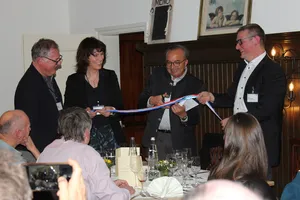Deutsch-Niederländisch-Französisches Doktorandenkolleg
Collège Doctoral Franco-Néerlandais-Allemand
French-Dutch-German Doctoral College
Port-Hamiltonian Systems: Modeling, Numerics and Control
Das von der Deutsch-Französischen Hochschule geförderte Doktorandenkolleg (2022-2025) richtet sich an Doktorand*innen aus Deutschland, Frankreich und den Niederlanden, die zur Entwicklung und Anwendung strukturierter, energiebasierter Verfahren für die Modellbildung, numerische Approximation und Regelung multiphysikalischer Systeme forschen. Es baut auf der langjährigen Zusammenarbeit zwischen Forschergruppen in den beteiligten Ländern auf, stellt einen institutionellen Rahmen zur Strukturierung der Doktorandenausbildung dar und fördert die Mobilität der jungen Forschenden durch finanzielle Beihilfen für Forschungsaufenthalte in den Partnerländern.
Le collège doctoral (2022-2025) financé par l'Université Franco-Allemande s'adresse aux doctorants d'Allemagne, de France et des Pays-Bas qui travaillent sur le développement et l'application de méthodes structurées, basées sur l'énergie, pour la modélisation, l'approximation numérique et le contrôle des systèmes multi-physiques. Il s'appuie sur la coopération de longue date entre les groupes de recherche des pays participants, fournit un cadre institutionnel pour structurer la formation doctorale et favorise la mobilité des jeunes chercheurs en apportant un soutien financier aux séjours de recherche dans les pays partenaires.
The doctoral college (2022-2025), funded by the Franco-German University, is aimed at PhD students from Germany, France and the Netherlands working on the development and application of structured, energy-based methods for modeling, numerical approximation and control of multiphysical systems. It builds on the long-standing collaboration between research groups in the participating countries, provides an institutional framework for structured doctoral training, and promotes the mobility of young researchers by providing financial support for research stays in the partner countries.
Coordination
The doctoral college is coordinated by Paul Kotyczka (Technical University of Munich) and Bernhard Maschke (Université Claude Bernard Lyon 1) with Jacquelien Scherpen (Rijksuniversiteit Groningen) as partner in the Netherlands and supported by the Franco-Bavarian University Cooperation Center BayFrance at TUM.
The photo on the right shows TUM Senior Vice President Prof. Gerhard Müller officially opening the doctoral college by cutting ribbons in the colors of France, the Netherlands and (!) Bavaria during the welcome dinner. The kick-off took place during the 2nd Spring School on Theory and Applications of Port-Hamiltonian Systems (PHS 2022) from 20 to 25 March 2022. Seven of the 37 participants were already inscribed in the doctoral college.
Doctoral Workshops and Mobility
The main pillars of the doctoral college are the support of doctoral mobility (600 € per month) and half-yearly workshops organized by (in alphabetical order)
Sören Hohmann (Karlsruhe), Birgit Jacob (Wuppertal), Paul Kotyczka (Munich), Yann Le Gorrec (Besançon), Bernhard Maschke (Lyon), Denis Matignon (Tolouse), Jacquelien Scherpen (Groningen), Hans Zwart (Twente).
For the planning of the workshops and the download of forms concerning mobility visit the subpage Organization.
Application
If you work in the field of port-Hamiltonian systems in France, Germany or the Netherlands, and if you are interested in joining the doctoral college, please send a message with some short information (research group/supervisor, PhD topic, start of PhD) to the following e-mail address:
You will obtain an inscription form to joint the doctoral college.
Contact

PD Dr.-Ing. habil. Paul Kotyczka
Tel.: +49 (89) 289 - 15663

Susanne Schwanbeck (BayFrance)
Tel.: +49 (89) 289 - 22601
E-Mail: cdfa-phs.rt(at)ed.tum.de





